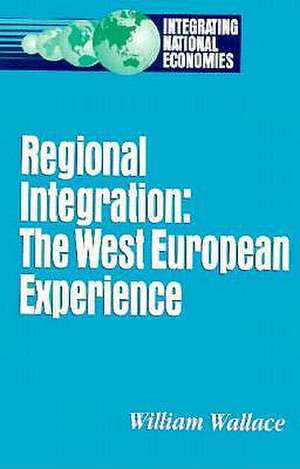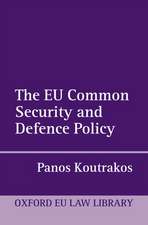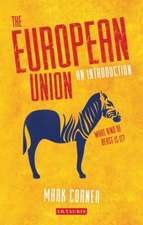Regional Integration: The West European Experience
Autor William Wallaceen Limba Engleză Paperback – noi 1994
The European Union is the oldest and most highly developed example of institutionalized regional integration. Since its establishment in the early 1950s, the EU has moved from the shallow integration of dismantling trade barriers to the deep integration of accepting common policies on agriculture, environment, transport, and working conditions; common rules on competition, mergers, and financial transfers; and common laws in the domestic courts of member states.
The EU experience is a successful example of integrating national economies, but how far should those promoting regional integration in the Western Hemisphere and the Pacific look to the EU as a model? Can regional and global integration proceed harmoniously? Or will tensions between regional and global priorities unavoidably arise.
This book, part of the Integrating National Economies series, examines the evolution of West European integration over the past forty years. William Wallace analyzes the historical circumstances under which the institutions of integration developed, and the internal tensions and contradictions created by the deepening of integration and repeated enlargements. He explains that, in recent years, deep integration has presented a challenge to national identity, forcing policymakers to confront issues of sovereignty, political commitment, and regional balance.
Wallace concludes that the European experience provides a number of important, cautionary lessons for those promoting regional integration in the Western Hemisphere and the Asia-Pacific region. However, it does not offer a model that these areas can easily follow. Wallace emphasizes that the experience of West European economic integration during the cold war years will do little to reconcile global and regional integration in the post-cold war world; the political and security concerns are no longer the same. He contends that the international community must develop rules for the new global order without searching for historical parallels--as those creating the institutions of regional integration in Western Europe did in their time.
A volume of Brookings' Integrating National Economies Series
The EU experience is a successful example of integrating national economies, but how far should those promoting regional integration in the Western Hemisphere and the Pacific look to the EU as a model? Can regional and global integration proceed harmoniously? Or will tensions between regional and global priorities unavoidably arise.
This book, part of the Integrating National Economies series, examines the evolution of West European integration over the past forty years. William Wallace analyzes the historical circumstances under which the institutions of integration developed, and the internal tensions and contradictions created by the deepening of integration and repeated enlargements. He explains that, in recent years, deep integration has presented a challenge to national identity, forcing policymakers to confront issues of sovereignty, political commitment, and regional balance.
Wallace concludes that the European experience provides a number of important, cautionary lessons for those promoting regional integration in the Western Hemisphere and the Asia-Pacific region. However, it does not offer a model that these areas can easily follow. Wallace emphasizes that the experience of West European economic integration during the cold war years will do little to reconcile global and regional integration in the post-cold war world; the political and security concerns are no longer the same. He contends that the international community must develop rules for the new global order without searching for historical parallels--as those creating the institutions of regional integration in Western Europe did in their time.
A volume of Brookings' Integrating National Economies Series
Preț: 179.90 lei
Nou
Puncte Express: 270
Preț estimativ în valută:
34.42€ • 36.03$ • 28.65£
34.42€ • 36.03$ • 28.65£
Carte tipărită la comandă
Livrare economică 31 martie-14 aprilie
Preluare comenzi: 021 569.72.76
Specificații
ISBN-13: 9780815792239
ISBN-10: 0815792239
Pagini: 178
Dimensiuni: 152 x 229 x 13 mm
Greutate: 0.24 kg
Ediția:New.
Editura: Brookings Institution Press
Colecția Brookings Institution Press
Locul publicării:United States
ISBN-10: 0815792239
Pagini: 178
Dimensiuni: 152 x 229 x 13 mm
Greutate: 0.24 kg
Ediția:New.
Editura: Brookings Institution Press
Colecția Brookings Institution Press
Locul publicării:United States
Notă biografică
William Wallace is a professor of international relations at the London School of Economics and Political Science.
Descriere
The European Union is the oldest and most highly developed example of institutionalized regional integration. Since its establishment in the early 1950s, the EU has moved from the shallow integration of dismantling trade barriers to the deep integration of accepting common policies on agriculture, environment, transport, and working conditions; common rules on competition, mergers, and financial transfers; and common laws in the domestic courts of member states.
The EU experience is a successful example of integrating national economies, but how far should those promoting regional integration in the Western Hemisphere and the Pacific look to the EU as a model? Can regional and global integration proceed harmoniously? Or will tensions between regional and global priorities unavoidably arise.
This book, part of the Integrating National Economies series, examines the evolution of West European integration over the past forty years. William Wallace analyzes the historical circumstances under which the institutions of integration developed, and the internal tensions and contradictions created by the deepening of integration and repeated enlargements. He explains that, in recent years, deep integration has presented a challenge to national identity, forcing policymakers to confront issues of sovereignty, political commitment, and regional balance.
Wallace concludes that the European experience provides a number of important, cautionary lessons for those promoting regional integration in the Western Hemisphere and the Asia-Pacific region. However, it does not offer a model that these areas can easily follow. Wallace emphasizes that the experience of West European economic integration during the cold war years will do little to reconcile global and regional integration in the post-cold war world; the political and security concerns are no longer the same. He contends that the international community must develop rules for the new global order witho
The EU experience is a successful example of integrating national economies, but how far should those promoting regional integration in the Western Hemisphere and the Pacific look to the EU as a model? Can regional and global integration proceed harmoniously? Or will tensions between regional and global priorities unavoidably arise.
This book, part of the Integrating National Economies series, examines the evolution of West European integration over the past forty years. William Wallace analyzes the historical circumstances under which the institutions of integration developed, and the internal tensions and contradictions created by the deepening of integration and repeated enlargements. He explains that, in recent years, deep integration has presented a challenge to national identity, forcing policymakers to confront issues of sovereignty, political commitment, and regional balance.
Wallace concludes that the European experience provides a number of important, cautionary lessons for those promoting regional integration in the Western Hemisphere and the Asia-Pacific region. However, it does not offer a model that these areas can easily follow. Wallace emphasizes that the experience of West European economic integration during the cold war years will do little to reconcile global and regional integration in the post-cold war world; the political and security concerns are no longer the same. He contends that the international community must develop rules for the new global order witho
















